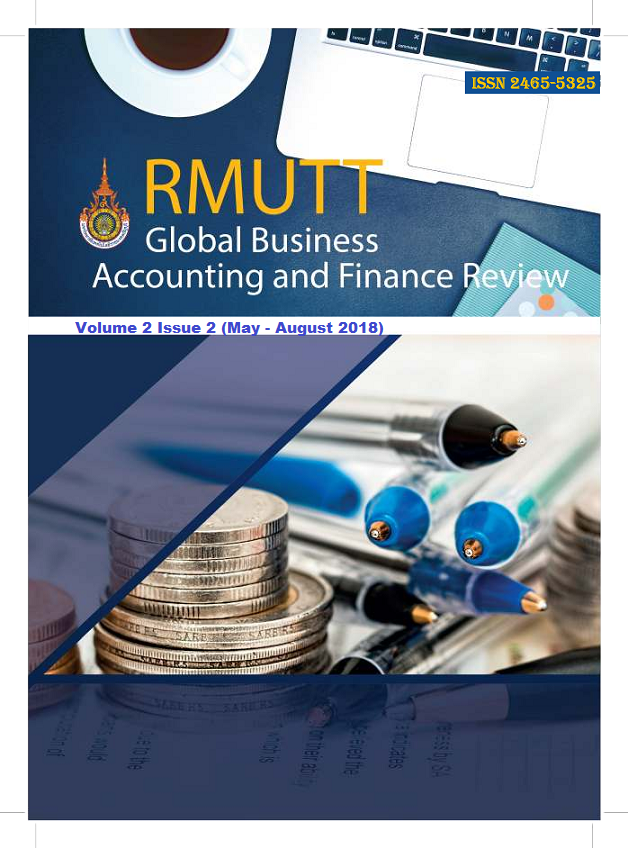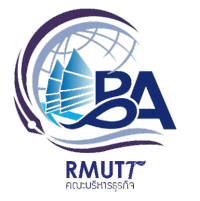ADVANTAGE, USAGE, AND RELATIONSHIP OF ACCOUNTING AND FINANCIAL KNOWLEDGE IN SMALL AND MEDIUM ENTERPRISES
Keywords:
Knowledge of Accounting, Knowledge of Finance, Benefit of Accounting Knowledge, Benefit of Financial KnowledgeAbstract
This article presents the use of accounting and financial knowledge, the benefits of using the knowledge of accounting and finance and the relationship between the use and the benefits of accounting and financial knowledge for the small and medium enterprises offering the community products. The respondents of this study were 70 small and medium enterprises which produced community products in Pathumthani province in 7 districts and each district consisted of 10 business. The data were collected by using self-reported questionnaires with quota and snow ball effect sampling. After data collection, the descriptive statistics such as frequency, percentage, mean and standard deviation were employed for data analysis. In terms of hypotheses testing, the Pearson’s correlation, and simple and multiple linear regression were used to test the predictive and causal relationships between the use and the benefits of using accounting and financial knowledge.
The study found that most of the respondents have the small and medium enterprises with no more than ten members / employees, earned revenue between 10,000-50,000 baht, owned the capital investment, employed an accounting officer and conducted corporate accounting. Pearson’s correlation indicated that all variables are moderately and highly correlated. The regression model analysis indicated 3 equations with the coefficients as of .768 .673 and .734, respectively.
References
Bunturat, P., Suriya, S., & Sirathananon, T. (2010). Business finance. n.p
Burke, K., P. (2003). Financial Accounting. Bangkok: TAP Publishing Co., Ltd.
Chinpaisan, T. (2009). Business Finance (Completed). (19th ed.). Bangkok: Yongpol Trading Co., Ltd.
Chittithaworn, C., Islam, M. A., Keawchana, T., & Yusuf, D. H. M. (2011). Factors affecting business success of small & medium enterprises (SMEs) in Thailand. Asian Social Science, 7(5), 180.
George, D., & Mallery, P. (2016). IBM SPSS statistics 23 step by step: A simple guide and reference. Routledge.
Hiranrassamee, T., Chattraporn, P., Kiatkulwattana, P., & Manowan, P. (2012). Business finance. Bangkok: Triple Education.
Information and Communication Section. (2017). Geography. Accessed on 12 November 2017, Derived from http://www2.pathumthani.go.th/index.php?option=com_content&view= article&id=7&Itemid=180
Khawnngen, S. (2005). Financial Accounting Principles. Bangkok: SE-EDucation, Pcl.
Leenothai, P. (2011). Business finance. Bangkok: Triple Education.
Lusardi, A., Mitchell, O. S., & Curto, V. (2010). Financial literacy among the young. Journal of consumer affairs, 44(2), 358-380.
Mohamed, E. K., & Lashine, S. H. (2003). Accounting knowledge and skills and the challenges of a global business environment. Managerial Finance, 29(7), 3-16.
Nirapornkul., N., Wasinarom, W., Arjharn, J., Tongkong, S., & Suthisanon, A. (2010). Business Finance (7th ed.). Bangkok: Triple Education.
Nong Khai Community Development Office. (2017). Participation to One Tambon One Product – OTOP. Accessed on 12 November 2017, Derived from http://nongkhai.cdd.go.th/participationotop.
Ounhanaa, S. (2003). Financial Management Volume 1. Bangkok: Publisher of Chulalongkorn University
Peapjariyawa, O. (2006). Accounting Principles: Essentials and Examples of Disclosure, Bangkok: The Stock Exchange of Thailand.
Pengsuwan, N., Narkmai, W., Somsoda, J., Chaiprapak, S., Traisit, M., Rammadech, E., S Songmueng, J., Kaewkerd, S., & Pungyani, S. (2010). Financial Accounting. Bangkok: Triple Education.
Pimpat, K. (2011). Business Finance. Bangkok: Odeon Store
Sangsan, P., & Kongsawadkiat, K. (2009). Business Finance Management, authored by Stephen A. Ross, Randolph W. Westerfield and Bradford D. Jordan. Bangkok: McGraw-Hill Publishing
Sarapaivanich, N., & Kotey, B. (2006). The effect of financial information quality on ability to access external funds and performance of SMEs in Thailand. Journal of Enterprising Culture, 14(03), 219-239.
Sirikutta, S., & Yungtinnang, P. (2007). Financial Accounting. Diamond In Business World.
Tabachnick, B. G., & Fidell, L. S. (2001). Using multivariate analysis. Boston: Allyn and Bacon.
Uyar, A., & Güngörmüş, A. H. (2013). Perceptions and knowledge of accounting professionals on IFRS for SMEs: Evidence from Turkey. Research in Accounting Regulation, 25(1), 77-87.
Vera-Munoz, S. C., Ho, J. L., & Chow, C. W. (2006). Enhancing knowledge sharing in public accounting firms. Accounting Horizons, 20(2), 133-155.
Wirapri, W., & Leekpai, J. (2004). Accounting system. Bangkok: Publisher of Chulalongkorn University









